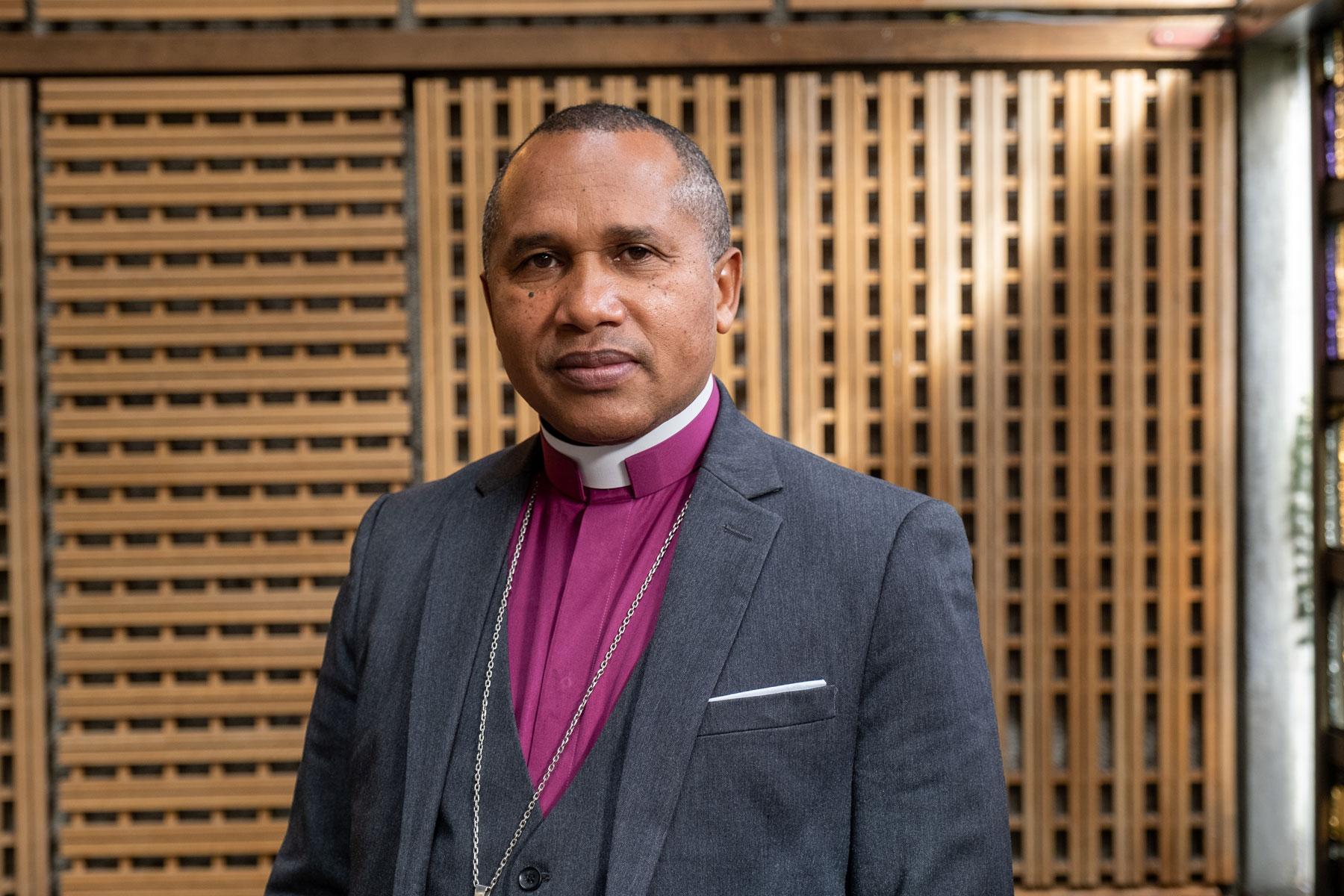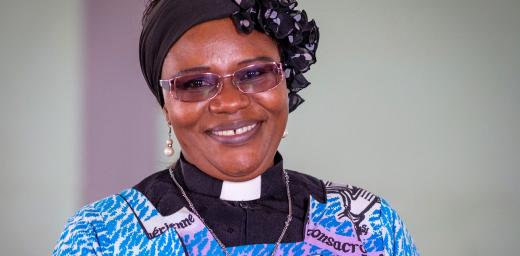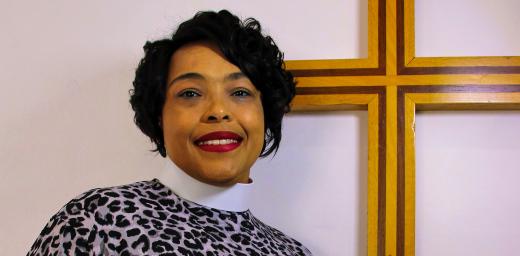Madagascar: Self-sustainability is key for a growing church

Rev. Dr Denis Rakotozafy, President, Malagasy Lutheran Church. Photo: LWF/A. Danielsson
Voices from the Communion: Rev. Dr Denis Rakotozafy, President, Malagasy Lutheran Church
(LWI) – It is slightly over one year since Rev. Dr Denis Rakotozafy assumed office as President of the Malagasy Lutheran Church (MLC). He looks back at moving from “a tough time of grieving and huge loss for the church,” in Madagascar, coping with devastating drought, and why the church is prioritizing sustainability.
In this interview he also explains why an LWF scholarship fund named after a leading woman theologian of the MLC is an honor to the church and her family.
You assumed office during a difficult time in the church, how has it been?
My election followed by installation on 6 December was preceded by a very challenging situation. The coronavirus disease was spreading fast, and many people had passed away including the former church president Rev. Dr David Rakotonirina in July, and several other pastors and church workers. It was a tough time; many people were grieving for the sudden and huge loss for families and for the church. At the height of the COVID-19 pandemic in March 2020, we closed all our churches for several months in line with the government’s regulations to stop the spread of the virus. We experienced a lot of challenges, including difficulties in providing financial support for pastors, catechists and evangelists.
How were you reaching out to congregations during this time?
Since movement was restricted, we turned to mobile phone communication at first to reach our congregation members. We also broadcast Sunday services on the private and public TV channels and on radio. We had to combine these different approaches to try and reach as many people as possible, especially those in the rural areas who have limited access to modern communication tools. But people missed the tradition of coming to church on Sunday, having fellowship with one another, singing together, praying together, this is very important.
The COVID-19 restrictions have relaxed, how does this affect the church?
We reopened our churches fully in July 2021. We continue to observe the public health requirements of social distancing, wearing masks and providing sanitizers. Church attendance is now very high. When people came back, many congregations, especially in urban areas have up to four services every Sunday. In other places, people congregated outdoors under trees. So, we are coming back to normal, but COVID-19 is still spreading, and we must make sure that those who want to come to church respect these measures.
One of the things that has changed is the distribution of Holy Communion. For the bread it is easy, but it is complicated when it comes to the wine. Before we used one chalice for many people. With the pandemic, we tried using the small cups, but this was not cost effective for the church. So, we consulted with our members, and they proposed to bring their own cups from home. It is not a permanent solution, and it may not appear to be the most ideal, but people can partake, it is practical in our context.
What are some of the long-term strategic priorities of the church?
From its early beginnings in 1894, the Malagasy Lutheran Church has had a vibrant revival movement, which has greatly influenced the growth of the church. However, we need to focus more on the church’s sustainability. For example, we do not have enough pastors to serve our growing congregations, more than 4,000, out of which 70 percent are in rural areas. In some places, pastors are responsible for six to 12 congregations covering between 50 and 100 kilometers. We need to strengthen our theological education and formation of pastors. It is a fast-growing church with strong engagement in the country’s sectors of education, health, communication and agriculture. The strength of our pastoral ministry and diaconal and development work is crucial for the church’s sustainability.
How is the church responding to the drought situation in the southern part of the country?
Four years of recurring drought in southern Madagascar came with great suffering in six of our synods: rivers dried up, sand and dust everywhere, nothing grew, people were forced to eat cactus leaves. In September we provided some relief to the most vulnerable people with support from our partners including the LWF and the Evangelical Church of the Augsburg Confession in the Slovak Republic. The government also provided relief, and the situation is better now, it has rained.
This brings me back to sustainability. Our church team could only assist the few people identified as most critical by the village chiefs. It is difficult when you can see so many people in need, but you can only help 200 to 600. One of our priorities is to invest in sustainable agriculture by establishing seed banks for diversified crops including the drought resistant types on church-owned land. We will provide six sites for seeds and invest in the communities there to grow the crops.
My priority is to have a church-wide project on self-sustainability. It is not only about food sufficiency but also how we can invest in what the church owns. Often, we are looking to our partners abroad, yet we have many properties. We also need to establish one basket for the salary of all our pastors in Madagascar. In the current situation, life is difficult for those serving in the rural areas. The congregation members are working very hard, but there is little or no produce from the land, and thus people do not have enough for themselves and the church.
In June 2021, the LWF established the Hélène Ralivao fund to honor the legacy of a pioneer woman theologian in Madagascar? What does this signify for you?
Ralivao is one of the famous women in Madagascar. She spent her entire life fighting for others to advance. Her death in February 2020 is something we will always remember. The fund is an honor to her family and to the Malagasy Lutheran Church. So, I bring special thanks to the LWF for awarding scholarships in her name to help our women and the young generation to think about how to bring the gospel to all people.
What does it mean for you, for your church to belong to the LWF Communion?
We are blessed because of the LWF. The LWF has been meaningful to us in many ways including diaconal support over many years now. During the pandemic we received assistance through the COVID-19 Rapid Response Fund, in addition to other long-term project support. We will continue to work together in the Lutheran communion to make everything possible to bring the gospel to the people.
By LWF/P. Mumia
The Malagasy Lutheran Church has over 4 million members and it is one of the four main Christian denominations in Madagascar. With 25 synods in the country and one in Europe, it sends missionaries to Bangladesh, Cameroon, Papua New Guinea, Thailand and Tanzania, mostly as pastors or in diaconal ministries, such as medical personnel. It joined the LWF in 1950.
The Lutheran World Federation is a global body that shares the work and love of Christ in the world. In this series, we profile church leaders and staff as they discuss topical issues and set out ideas for building peace and justice in the world, ensuring the churches and communion grow in witness and strength.




